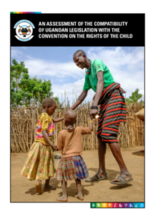Uganda became a party to the Convention on the Rights of the Child (CRC) in 1990, thereby assuming the obligation to undertake “all appropriate legislative measures for the implementation of the rights recognised in the Convention.” This report presents an assessment of the compatibility of the legislation of Uganda with the rights and principles recognised by the Convention and its two Optional Protocols to which Uganda became a party in 2001 and 2002 respectively.
The purpose of the assessment was two-fold: To identify legislative provisions that are incompatible with international standards, as well as the gaps where the legislation fails to recognise or does not adequately recognise or protect international human rights standards. The findings indicated that some legislations were compatible with the CRC including: those on nationality; child protection; alternative care; juvenile justice; crimes against children; and treatment of child victims in Uganda. However, some others, as this assessment revealed, had gaps and did not comply with some of the standards in the CRC and other international and regional human rights treaties.
The assessment covered legislation concerning key human rights issues such as: the right to identity, child protection, alternative care, juvenile justice, crimes against children, rights and treatment of child victims, health, education, children with disabilities and marriage, divorce and property. The compatibility of 37 statutes with Uganda’s obligations under the CRC and related treaties was assessed and 61 recommendations made.
In the report, the relevant provisions of the CRC on a given right are outlined and the provisions of the legislation in Uganda that provide for it identified. The compatibility of the Ugandan legislation on that particular right with the CRC was analysed; the gaps identified and appropriate recommendations made. In some few instances, the assessment went beyond the CRC to cover other international human rights instruments.

